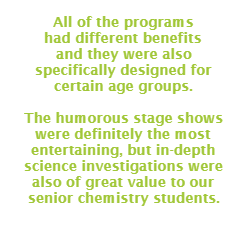Drought in Hindsight: Education Expert
Meet Lyn Jefferies
Lyn has been teaching for more than a decade with in depth experience in curriculum development and design and educational leadership. She is currently the Manager, Pedagogy for the South Australian Department for Education and Child Development and a STEM Coordinator for Heathfield High School in Adelaide, South Australia.
Lyn holds a Masters of Education, Bachelor of Agricultural Science and an Advanced Diploma of Gifted Education. When not in or thinking about the classroom you can find Lyn enjoying the majestic River Murray.
Q: Where were we you living toward the end of the Millennium Drought (specifically 2006-2009)?
A: Oakbank, South Australia.
Q: What kinds of work did your role involve during the end of the Millennium Drought (specifically 2006-2009)?
A: I provided educational guidance to an internal education team in a water utility. This work included planning, implementing and reviewing cross disciplinary learning programs for school age children.
The result was the SA Water Brainwave R-12 curriculum-based learning program which reached more than 25,000 students and 700 teachers. The professional learning for teachers and leaders covered water supply, water management and water sustainability.
The programs we created aligned with the Australian Curriculum, which was new at the time. We also needed to meet the needs of the water utility (South Australian Water Corporation) and the South Australian Education Department (the state government education authority).
Q: Could you share a short personal story or experience that sticks out in your mind from the drought?
A: During the drought many “aha” moments occurred! Some were shocking, like the impact the drought had on the River Murray. We have a holiday home on the river’s bank and spend summers water skiing and wakeboarding. During the drought, as the river flow slowed and the banks started to collapse into the river—due to a lack of water pressure holding them up—we extended our jetty with a floating pontoon. This meant we could get to our boat by walking UNDER the jetty onto the pontoon!
Another interesting memory for me from the drought was the way it impacted the fish life. The native Murray Cod noticed the receding water and moved to deeper areas of the river, leaving the backwaters and estuaries. The introduced European Carp, which is a pest species in the river, did not respond the same way and died in the shallows as the water levels dropped.
Q: With the drought in mind, what is one piece of advice you would tell your past self?
A: The water program we developed and the learning about sustainability was so valuable and emotionally rewarding that I wish we could have reached more people. So many adults accompanying the children commented on the value of the program to their own knowledge and talked of how it changed their habits.
Q: In your opinion, what were the most successful programs for students to learn about water and drought? Why do you think they were successful?
A: All of the programs had different benefits and they were also specifically designed for certain age groups. The humorous stage shows were definitely the most entertaining, but in-depth science investigations were also of great value to our senior chemistry students.

Q: In your education role during the drought what were the most challenging decisions you had to make?
A: It was challenging to decide which schools should be subsidised for their bus transport and which should be able to pay for it. The cut-off point ended up being the socio-economic rating of the community which sometimes seemed unfair.
Q: Did your attitudes toward water change during/after the drought?
A: Yes, I learned a great deal about water and water management, water quality and water supply during this time. As a result my appreciation increased for how much science and data is behind decisions being made to keep the water supply sustainable. I changed my habits and my family did too, we now conserve the rain water we collect more carefully and consider the environment when using water.
Q: Do you think people’s attitudes to water management changed because of the drought?
A: It certainly changed at the time of the drought and for some time after, however I feel we have forgotten and become a bit complacent recently with rains way above average this year.
Q: What are the top three things you believe people working in education can do to help the management of droughts in the future?
A: Help people—including children—make science based decisions about how they use water and help everyone change their habits to live more sustainably with the water resources we have.
Also, help people and children understand the science behind decisions that water utilities and water managers make, and the extensive nature of the role they play in delivering potable (or recycled if relevant) water to households and businesses.
Q: Do you have any advice you’d like to share with Canadians about water management?
A: The librarian I worked with (Hayley Morton) wrote a series of books to help very young children understand the messages we were sharing. These were well received but I found it most amusing that the kids loved the book for the slightly risky toilet scene and another part where a salt water drop lost his clothing through the desalination process. These were the amusing hooks that engaged the children to request these books again and again at bedtime.
During the drought we often thought about the Canadian situation and from here in Australia we believed Canada would always have an abundance of water to meet their needs. Today water is an international issue and education of all ages is key ensure its sustainable supply and use.
Download this Q&A as a PDF.
